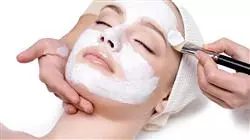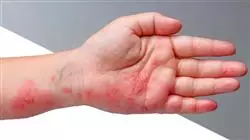University certificate
The world's largest faculty of pharmacy”
Introduction to the Program
You'll get up to date on the most pressing skin pathologies, including toxicoderma, dermatitis, alopecia, acne, sensitive skin, pigmentation disorders and more"

As the skin is one of the most important organs in Aesthetic Medicine, it is to be expected that most of the advances and developments in this area revolve around it. New discoveries in nutraceuticals, sun photo-protection and specific treatments for each pathology offer a series of tools of great value to the pharmacist, who must be familiar with them and update his knowledge on a regular basis in order to incorporate them into his daily practice.
For this reason, TECH has brought together a team of professional experts in Aesthetic Medicine to prepare the contents of this program. Their practical vision is a decisive advantage when it comes to contextualizing the theory, which allows for a much more efficient and rapid update for the pharmacy specialist.
In addition, taking into account how difficult it is to combine a degree of these characteristics with the usual professional and personal life, a completely online format has been established. This means that there are no on-site classes or fixed schedules, giving the pharmacist total freedom to take on the course load according to his or her own pace and interests.
You will be able to download the entire syllabus from day one, giving you the flexibility you need to combine academic, professional and personal aspects"
This Postgraduate certificate in Aesthetic Medicine in Pharmacy: Skin Pathologies contains the most complete and up-to-date scientific program on the market. The most important features include:
- Practical cases presented by experts in Aesthetic Medicine
- The graphic, schematic, and practical contents with which they are created, provide scientific and practical information on the disciplines that are essential for professional practice
- Practical exercises where self-assessment can be used to improve learning
- Its special emphasis on innovative methodologies
- Theoretical lessons, questions for experts and individual reflection work
- Availability to access content from any fixed or portable device with internet connection
You will have access to high quality support and reinforcement material, made up of a multitude of audiovisual resources and complementary readings"
The program’s teaching staff includes professionals from the sector who contribute their work experience to this educational program, as well as renowned specialists from leading societies and prestigious universities.
Its multimedia content, developed with the latest educational technology, will provide the professional with situated and contextual learning, i.e., a simulated environment that will provide an immersive education programmed to learn in real situations.
The design of this program focuses on Problem-Based Learning, by means of which the professional must try to solve the different professional practice situations that are presented throughout the academic course. For this purpose, the student will be assisted by an innovative interactive video system created by renowned experts.
Choose where, when and how. At TECH you don't have the pressure of classroom classes and schedules to which you have to adapt"

You will have the guarantee of security and confidence of the entire teaching staff, made up of professional experts in Aesthetic Medicine"
Why study at TECH?
TECH is the world’s largest online university. With an impressive catalog of more than 14,000 university programs available in 11 languages, it is positioned as a leader in employability, with a 99% job placement rate. In addition, it relies on an enormous faculty of more than 6,000 professors of the highest international renown.

Study at the world's largest online university and guarantee your professional success. The future starts at TECH”
The world’s best online university according to FORBES
The prestigious Forbes magazine, specialized in business and finance, has highlighted TECH as “the world's best online university” This is what they have recently stated in an article in their digital edition in which they echo the success story of this institution, “thanks to the academic offer it provides, the selection of its teaching staff, and an innovative learning method aimed at educating the professionals of the future”
A revolutionary study method, a cutting-edge faculty and a practical focus: the key to TECH's success.
The most complete study plans on the university scene
TECH offers the most complete study plans on the university scene, with syllabuses that cover fundamental concepts and, at the same time, the main scientific advances in their specific scientific areas. In addition, these programs are continuously being updated to guarantee students the academic vanguard and the most in-demand professional skills. In this way, the university's qualifications provide its graduates with a significant advantage to propel their careers to success.
TECH offers the most comprehensive and intensive study plans on the current university scene.
A world-class teaching staff
TECH's teaching staff is made up of more than 6,000 professors with the highest international recognition. Professors, researchers and top executives of multinational companies, including Isaiah Covington, performance coach of the Boston Celtics; Magda Romanska, principal investigator at Harvard MetaLAB; Ignacio Wistumba, chairman of the department of translational molecular pathology at MD Anderson Cancer Center; and D.W. Pine, creative director of TIME magazine, among others.
Internationally renowned experts, specialized in different branches of Health, Technology, Communication and Business, form part of the TECH faculty.
A unique learning method
TECH is the first university to use Relearning in all its programs. It is the best online learning methodology, accredited with international teaching quality certifications, provided by prestigious educational agencies. In addition, this disruptive educational model is complemented with the “Case Method”, thereby setting up a unique online teaching strategy. Innovative teaching resources are also implemented, including detailed videos, infographics and interactive summaries.
TECH combines Relearning and the Case Method in all its university programs to guarantee excellent theoretical and practical learning, studying whenever and wherever you want.
The world's largest online university
TECH is the world’s largest online university. We are the largest educational institution, with the best and widest online educational catalog, one hundred percent online and covering the vast majority of areas of knowledge. We offer a large selection of our own degrees and accredited online undergraduate and postgraduate degrees. In total, more than 14,000 university degrees, in eleven different languages, make us the largest educational largest in the world.
TECH has the world's most extensive catalog of academic and official programs, available in more than 11 languages.
Google Premier Partner
The American technology giant has awarded TECH the Google Google Premier Partner badge. This award, which is only available to 3% of the world's companies, highlights the efficient, flexible and tailored experience that this university provides to students. The recognition as a Google Premier Partner not only accredits the maximum rigor, performance and investment in TECH's digital infrastructures, but also places this university as one of the world's leading technology companies.
Google has positioned TECH in the top 3% of the world's most important technology companies by awarding it its Google Premier Partner badge.
The official online university of the NBA
TECH is the official online university of the NBA. Thanks to our agreement with the biggest league in basketball, we offer our students exclusive university programs, as well as a wide variety of educational resources focused on the business of the league and other areas of the sports industry. Each program is made up of a uniquely designed syllabus and features exceptional guest hosts: professionals with a distinguished sports background who will offer their expertise on the most relevant topics.
TECH has been selected by the NBA, the world's top basketball league, as its official online university.
The top-rated university by its students
Students have positioned TECH as the world's top-rated university on the main review websites, with a highest rating of 4.9 out of 5, obtained from more than 1,000 reviews. These results consolidate TECH as the benchmark university institution at an international level, reflecting the excellence and positive impact of its educational model.” reflecting the excellence and positive impact of its educational model.”
TECH is the world’s top-rated university by its students.
Leaders in employability
TECH has managed to become the leading university in employability. 99% of its students obtain jobs in the academic field they have studied, within one year of completing any of the university's programs. A similar number achieve immediate career enhancement. All this thanks to a study methodology that bases its effectiveness on the acquisition of practical skills, which are absolutely necessary for professional development.
99% of TECH graduates find a job within a year of completing their studies.
Postgraduate Certificate in Aesthetic Medicine in Pharmacy: Skin Pathologies.
Aesthetic medicine is a branch of medicine that focuses on improving the physical appearance of the patient, through non-invasive or minimally invasive treatments. In the case of skin pathologies, aesthetic medicine can offer alternatives to treat various conditions, such as premature aging, blemishes, scars and other aesthetic skin pathologies.
In the pharmaceutical industry, the development of products for aesthetic medicine in skin pathologies has advanced in recent years. Among the most commonly used products are dermal fillers, which fill fine lines and wrinkles, and neuromodulators, such as botulinum toxin, which helps smooth fine lines.
In addition, topical products have also emerged that contain active ingredients that can improve the quality and appearance of the skin, such as creams with hyaluronic acid, retinoids, vitamins and antioxidants.
In the field of technology, aesthetic medicine in skin pathologies has been driven by the emergence of high-tech equipment and devices, such as lasers and radiofrequency. These devices are used to improve skin texture, tone and overall appearance, reduce blemishes and scars, and stimulate collagen production.
It is important to note that any type of aesthetic medicine treatment to treat skin pathologies must be performed by a professional trained in the area, and its selection must be tailored to the individual needs of each patient. A proper evaluation of the skin pathology and an adequate selection of the treatment is also essential to achieve the desired results without affecting the patient's health.
The specialized Postgraduate Certificate in aesthetic medicine in pharmacy that includes skin pathologies provides students with the theoretical and practical knowledge necessary to identify, evaluate and treat various skin pathologies using aesthetic medicine techniques. Also, the program can help students understand the basic concepts of the skin, its structure and function, and the potential risks and side effects of treatments.







